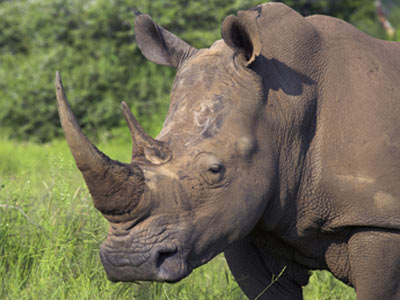Hunting the horn leaves the rhinos forlorn: Rhinoceros poaching in Africa

By Ellen Osborne
Even though rhinos are on the World Wildlife Fund’s list of critical species, over one thousand rhinoceroses have been poached in the last five years. To combat the increase of illegal poaching, INTERPOL launched Project Wisdom, which has led to 520 arrests, with an over 80% conviction rate, the shutting down of factories, the recovery of many other illegal exotic animals, dead and alive, and the seizure of illegal firearms.

Organized poaching gangs that use highly sophisticated equipment, such as helicopters, night vision, and silenced weapons, are responsible for most rhino poaching. But why on earth would these groups spend so much money while risking arrest to poach rhinos? They do it all for the horn.
Rhinoceros horn has been prized for centuries. A PBS article explains how the horn has been a sough-after product in Asian and the Middle East, dating as far back as the 7th century AD. It has been used for jewelry, dagger handles and belt buckles, but its use in traditional Asian medicine is what fuels the trade today. Poachers in Africa send the majority of their product to Asian medicine markets.
Traditional medical practitioners claim the rhinoceros horn can cure snakebites, headaches, gout, strokes, and hangovers, among other ailments. Over a quarter of these practitioners say the use of rhino horn is essential to their practice and 80% keep it in stock. Though one study found that large doses of rhino horn extract could slightly lower fevers in rats, there is no scientific evidence of its medical value to humans.
Despite the efforts of the World Wildlife Fund and INTERPOL, it seems that poaching will only cease when the demand decreases, which won’t happen any time soon. Sadly, rhinos will keep losing their horns until they become extinct.
And do you know what they call a rhino without a horn? Quiet.
Ellen Osborne is a Masters student in the International Crime and Justice program at John Jay College of Criminal Justice. She earned her Bachelors of Criminal Justice at Seattle University in Seattle, Washington for her studies in Criminal Justice with a focus on Forensic Psychology. She completed an internship at the Coalition for the International Criminal Court. In the new year, Ellen will begin a new internship with the Wild and Free Foundation, a non-profit that focuses on anti-poaching efforts and the conservation of rhinos, an endangered species.